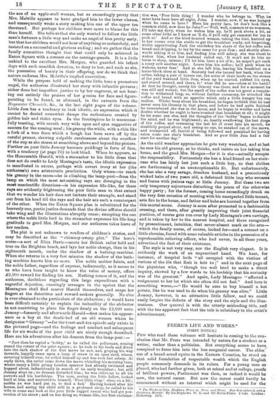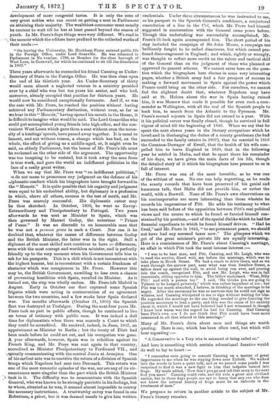FRERE'S LIFE AND WORKS.*
[FIRST NOTICE.]
FEW who read these volumes will hesitate in coming to the con- clusion that Mr. Frere was intended by nature for a student or a writer, rather than a politician. But everything seems to havef, conspired to force him into the less congenial career. The eldes, son of a broad-acred squire in the Eastern Counties, he stood olio that solid foundation of respectable wealth which the English people commonly demands in its rulers. For a young man so placed, who had further given, both at school and at college, proofs of brilliant powers, Parliament was then, as indeed it would be now, the natural career. But now the career could hardly be commenced without an interval which might be used for the • TM Works of John Hookhant Frere in Verse and Prose. Now first collected, with a Prefatory Memoir. By his Nephews, W. E. and Sir Bartle Frere. 2 vole. London: Pickering. 1871.
development of more congenial tastes. It is only the sons of very great nobles who can count on getting a seat in Parliament on attaining their majority. The wealthiest commoner must usually be content to wait till he has at least passed beyond the season of youth. In Mr. Frere's days things were very different. We read in the memoir which the editors have prefixed to the collected works of their uncle :—
" On leaving the University, Mr. Hookham Frere entered public life in the Foreign Office, under Lord Granville. He was returned to Parliament in No vember, 1796, as Member for the close borough of West Looe, in Corn wall, for which he continued to sit till the dissolution
in 1802."
Three years afterwards he succeeded his friend Canning as Under- \ Secretary of State in the Foreign Office. He was then close upon the end of his thirtieth year. An Under-Secretary of thirty would seem almost a neglected veteran in a ministry presided over by a chief who was but ten years his senior, and who had, moreover, already occupied that position for thirteen years. He would now be considered exceptionally fortunate. And if, as was the case with Mr. Frere, he reached the position without having achieved any Parliamentary distinction, without even, as far as we hear in this " Memoir," having opened his mouth in the House, it is difficult to imagine what would be said. The Lord Granvilles who could put accomplished young friends into high office, and the con- venient West Looes which gave them a seat without even the neces- sity of a hustings' speech, have passed away together. It is usual to lament, and not without reason, a change which has had, on the whole, the effect of giving us a middle-aged, or, it might even be said, an elderly Parliament, but the lesson of Mr. Frere's life must be reckoned on the other side of the argument. The opportunity was too tempting to be resisted, but it took away the man from is true work, and gave the world an indifferent politician in the dace of a really great writer.
When we say that Mr. Frere was " an indifferent politician," re di) not mean to pronounce any judgment on the defence of his uiplomatic conduct which his biographers have brought forward in the " Memoir." It is quite possible that his sagacity and judgment were equal to his undoubted ability, but diplomacy is a profession in which, above all others, success is the test of merit, and Mr. Frere was scarcely successful. His diplomatic career may be thus sketched. In October, 1800, he went as Envoy- Extraordinary and Plenipotentiary to Portugal. Two years afterwards he was sent as Minister to Spain, which was then governed by Manuel Godoy, the notorious " Prince of Peace." It was no discredit to an honourable man that he was not a persona grata in such a Court. Nor can it be doubted that, whatever the causes of difference between Godoy and the British Minister, the latter was in the right. Still a diplomat of the most skilled sort contrives to have no differences, even with the most corrupt and worthless minister, and is perfectly friendly up to the very moment when his Government tells him to ask for his passports. This is a skill which is not inconsistent with the highest honour, but is inconsistent with a certain frankness of character which was conspicuous in Mr. Frere. However this may be, the British Government, unwilling to lose even a chance of preventing hostilities with Spain, recalled its Minister. As it turned out, the step was wholly useless. Mr. Frere left Madrid in August. Early in October our fleet captured some Spanish frigates which were acting in contravention of an agreement between the two countries, and a few weeks later Spain declared war. Ten months afterwards (October 21, 1805) the Spanish fleet was destroyed at Trafalgar. During the next four years Mr. Frere took no part in public affairs, though he continued to live on terms of intimacy with public men. It was indeed a dull time for diplomatists when there was scarcely a Court to which they could be accredited. He received, indeed, in June, 1807, an appointment as Minister to Berlin ; but the treaty of Tilsit had been made before he could set out, and his occupation was gone. A year afterwards, however, Spain was in rebellion against its French King, and Mr. Frere was sent again to that country, accredited as Minister Plenipotentiary to Ferdinand VII., and tually communicating with the central Junta at Aranjuez. One of his earliest acts was to contrive the return of a division of Spanish troops which Napoleon had sent into Denmark. This return was one of the most romantic episodes of the war, nor are any of its cir- cumstances more singular than the part which the British Minister took in it. The difficulty was to communicate with the Spanish General, who was known to be strongly patriotic in his feelings, but to whom, situated as he was, it seemed almost impossible to convey the necessary instructions. A trustworthy envoy was found in one .Robertson, a priest, but it was deemed unsafe to give him written credentials. Under these circumstances he was instructed to use, as his passport to the Spanish General's confidence, a conjectural emendation of a line in the Cid, which Mr. Frere had himself suggested in conversation with the General some years before. Though this undertaking was successfully accomplished, Mr. Frere's ill-luck again accompanied him. The short period of his stay included the campaign of Sir John Moore, a campaign too brilliantly fought to be called disastrous, but which caused pro- found discouragement in England ; and which, rightly or wrongly, was thought to reflect more credit on the valour and tactical skill of the General than on the judgment of those who planned or approved its general scheme. We cannot enter here on the ques- tion which the biographers here discuss in some very interesting pages, whether a British army had a fair prospect of success in making a forward movement in Spain against the power which France could bring on the other side. For ourselves, we cannot feel the slightest doubt that, whatever Napoleon may have said at St. Helena about the war in Spain having ruined him, it was Moscow that made it possible for even such a com- mander as Wellington, with all the zeal of the Spanish people to back him, to march from the Atlantic to the Pyrenees. Mr. Frere's second sojourn in Spain did not extend to a year. With it his political career was finally closed, though he survived in full vigour of mind till the beginning of 1846. When we say that he spent the next eleven years in the literary occupations which he loved and in discharging the duties of a county gentleman (he had succeeded to the family estates in 1807), that he married in 181a the Countess-Dowager of Erroll, that the health of his wife com- pelled him to leave England in 1820, that in the following year he settled in Malta, and that he spent there his remainder of his days, we have given the main facts of his life, though the detailed story of it which his biographers here present to us is full of interest.
Mr. Frere was one of the most loveable, as he was one of the wittiest of men. No one can help regretting, as he reads the scanty records that have been preserved of his genial and humorous talk, that Malta did not provide him, or rather the world, with a Boswell. None of Mr. Frere's own observations on his contemporaries are more interesting than those wherein he records his impressions of Pitt. He adds his testimony to what has been said before of the opposition between Pitt's real political views and the course to which he found or fancied himself con- strained by his position,—and of the special dislike which he had for financial expedients to which he found himself driven. "Had he lived," said Mr. Frere in 1844, " to see permanent peace, we,shoulcl not have had any assessed taxes now." The glimpses which we get of the great minister's private life are equally interesting. Here is a reminiscence of Mr. Frere's about Canning's marriage, an affair in which Pitt took the most intense interest
I was to be beet man, and Pitt, Canning, and Mr. Leigh, who was to read the service, dined with me before the marriage, which was to take place in Brook Street. We had a coach to drive there, and as we went through the narrow part, near what was then Swallow Street, follow drew up against the wall, to avoid being run over, and peering into the coach, recognized Pitt, and saw Mr. Leigh, who was in fall canonicals, sitting opposite to him. The fellow exclaimed, What, Billy Pitt! and with a parson too !' I said, 'He thinks you are going to Tyburn to be hanged privately,' which was rather impudent of me ; but Pitt was too much absorbed, I believe, in thinking of the marriage to be angry. Af ter the ceremony he was so nervous that he could not sign as. witness, and Canning whispered to me to sign without waiting for him. He regarded the marriage as the one thing needed to give Canning the- position necessary to lead a party, and this was the cause of his anxiety about it, which I would not have believed had I not witnessed it, though I knew how warm was the regard he had for Canning. Had Canning been Pitt's own son I do not think that Pitt could have been more interested in all that related to this marriage."
Many of Mr. Frere's dicta about men and things are worth quoting. Here is one, which has been often used, but which will bear repeating
A Conservative is a Tory who is ashamed of being called so."
And here is something which certain educational fanatics would do well to lay to heart:— "I remember once going to consult Canning on a matter of great importance to me when he was staying down near Enfield. We walked into the woods to have a quiet talk, and as we passed some ponds I was surprised to find it was a new light to him that tadpoles turned into frogs. My uncle added, ' Now don't you go and tell that story to the next fool you meet.' Canning could rule, and did rule, a great and civilized nation, but in these days people are apt to fancy that any one who does not know the natural history of frogs must be an imbecile in the treatment of men."
We propose to return in another article to the subject of Mr. Frere's literary remains.











































 Previous page
Previous page